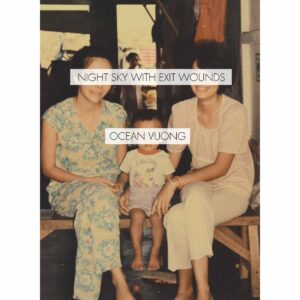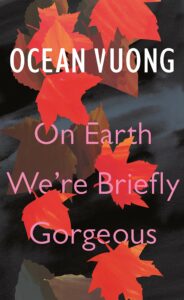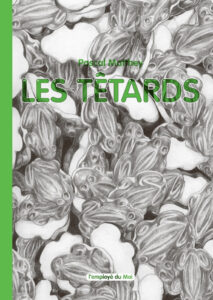Ocean Vuong is not a new name for me. Back in 2016, I stumbled over his poetry collection Night Sky With Exit Wounds while browsing NPR’s Book Concierge on the search for holiday reads. What caught my attention at the time was the name (what better word to encapsulate depth and uncertainty than ocean) but also the cover which displays two women sitting at the sides of a small boy in a faded and slightly ominous photograph. The poetry of the US-Vietnamese poet struck me. Vuong’s vivid, yet enigmatic pieces dealing with family, cultural heritage and same-sex desire left a dent in the back my mind, deep enough that I was excited to hear that he had released his debut novel this year.

My expectations were not disappointed: On Earth We’re Briefly Gorgeous is a fragmented yet beautiful work, the novel’s 240 pages feeling not long at all but condensed and sharp. Plot-wise it is a difficult book to pin down, however. As the falling leaves on the cover of the radiant UK edition suggest, Vuong’s novel deals a lot with transformation and loss. Written as a letter from a young man named Little Dog to his mother, the novel invites to be read autobiographically as the narrator shares many traits with Vuong himself, including his childhood immigration from Saigon to Hartford, Connecticut.

There are many different narrative strands in the book, from the experiences of Little Dog’s grandmother in South Vietnam during the war to the tragic story of the narrator’s drug addicted first love Trevor, who lives with his father in a trailer on the outskirts of town. What binds many of these strands together is that they revolve around different types of trauma and their effect on the body. The physical and mental wounds inflicted during the Vietnam war have painful repercussions in Little Dog’s life, from the schizophrenia and flashbacks of his grandmother to the violence and frustration of his mother.
The novel succeeds in conveying the state of loss and disorientation brought by the family’s move to the US, a foreign country both in culture and language. In one of the book’s many memorable passages, Vuong’s mother is humiliated in front of her son as she tries to buy oxtail for a Vietnamese dish at a local mall. Gasping for words, first in Vietnamese then in broken French, the butcher laughs at her final attempt to communicate with gestures. On Earth We’re Briefly Gorgeous treats the loss of language as a particularly painful wound, a perhaps irreparable blank space between severed connections, a void experienced only as phantom pain.
Many of the novel’s passages feel like memories in the sense that they are carried by a feeling of urgency and visceral sensory experience. This is especially true for the relationship between Little Dog and Trevor which takes up a considerable portion of the book. As the narrator visits Trevor in his trailer, he describes his yearning for the taste of his lover, the flavor of his tongue, the salt around his neck and scent of his fingers. Vuong’s language manages to feel both precise while repeatedly blooming into poetic imagery. In recounting the experience of being bullied during bus rides to school for example, Little Dog remembers pressing his head into the seat in front of him, looking at his electric sneakers which “erupted with silent flares: the world’s smallest ambulances, going nowhere.”
The novel avoids the pitfalls of devolving into a static assortment of such images through its elaborate structure. Vuong skillfully interweaves and juxtaposes different narrative strands, switching from past to present and back in a way that feels like it is creating a meaningful rhythm. At times, the experimental structure of the novel threatens to dissolve the narrative altogether, especially in the middle section where the prose breaks into fragmented sentences that somehow seem unfinished. But it all comes back together in the end, mirroring through its fractured form both the characters and perhaps even the state of the country as a whole. On Earth We’re Briefly Gorgeous is a beautiful novel that I will surely come back to in the years to come.
On Earth We're Briefly Gorgeous Ocean Vuong 2019 Penguin - Vintage

